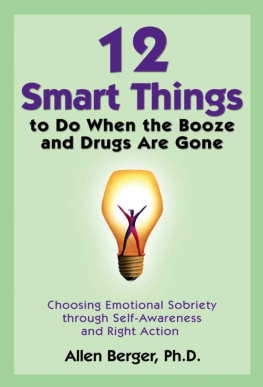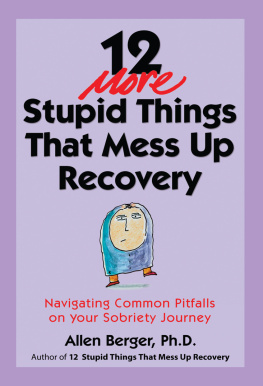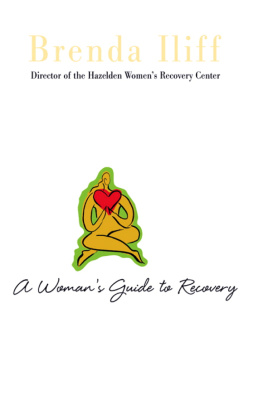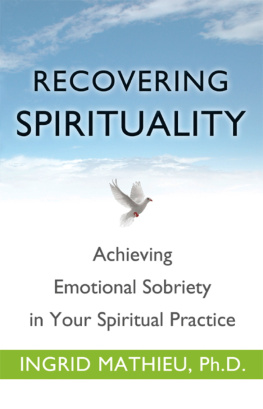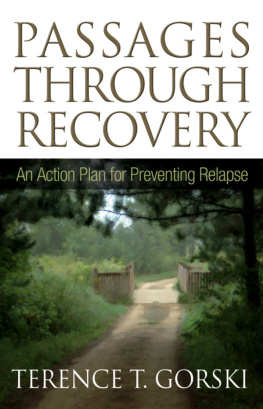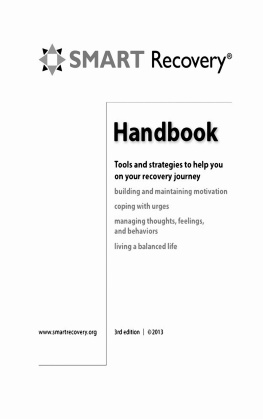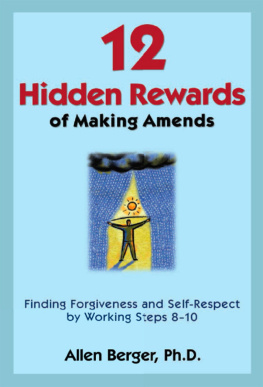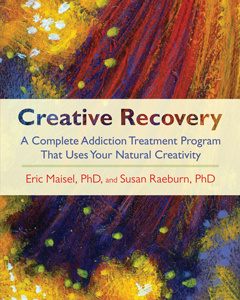Allen Berger - 12 Stupid Things That Mess Up Recovery & 12 Smart Things to Do When the Booze an: Avoiding Relapse and Choosing Emotional Sobriety through Self-Awareness and Right Action
Here you can read online Allen Berger - 12 Stupid Things That Mess Up Recovery & 12 Smart Things to Do When the Booze an: Avoiding Relapse and Choosing Emotional Sobriety through Self-Awareness and Right Action full text of the book (entire story) in english for free. Download pdf and epub, get meaning, cover and reviews about this ebook. year: 2010, publisher: Hazelden Publishing, genre: Religion. Description of the work, (preface) as well as reviews are available. Best literature library LitArk.com created for fans of good reading and offers a wide selection of genres:
Romance novel
Science fiction
Adventure
Detective
Science
History
Home and family
Prose
Art
Politics
Computer
Non-fiction
Religion
Business
Children
Humor
Choose a favorite category and find really read worthwhile books. Enjoy immersion in the world of imagination, feel the emotions of the characters or learn something new for yourself, make an fascinating discovery.

- Book:12 Stupid Things That Mess Up Recovery & 12 Smart Things to Do When the Booze an: Avoiding Relapse and Choosing Emotional Sobriety through Self-Awareness and Right Action
- Author:
- Publisher:Hazelden Publishing
- Genre:
- Year:2010
- Rating:3 / 5
- Favourites:Add to favourites
- Your mark:
12 Stupid Things That Mess Up Recovery & 12 Smart Things to Do When the Booze an: Avoiding Relapse and Choosing Emotional Sobriety through Self-Awareness and Right Action: summary, description and annotation
We offer to read an annotation, description, summary or preface (depends on what the author of the book "12 Stupid Things That Mess Up Recovery & 12 Smart Things to Do When the Booze an: Avoiding Relapse and Choosing Emotional Sobriety through Self-Awareness and Right Action" wrote himself). If you haven't found the necessary information about the book — write in the comments, we will try to find it.
12 Stupid Things That Mess Up Recovery contains concise advice on hunting down the personal culprits that sabotage sobriety and personal happiness. To grow in recovery, we must grow up emotionally. This means getting honest with ourselves and facing up to the self-defeating thoughts and actions that put our sobriety at risk. Although there are as many ways to mess up recovery as there are alcoholics and addicts, some general themes exist, which include: confusing self-concern with selfishness; not making amends; using the program to try to become perfect; not getting help for relationship troubles; and believing that life should be easy. In simple, down-to-earth language, Allen Berger explores the twelve most commonly confronted beliefs and attitudes that can sabotage recovery. He then provides tools for working through these problems in daily life.
12 Smart Things to Do When the Booze and Drugs Are Gone offers a fresh list of smart things to do to attain and sustain emotional sobriety. Whether its called dry drunk or white knuckle sobriety, its that stage in recovery when we realize that putting the plug in the jug isnt enough. The next step is taking responsibility for the emotional immaturity that fuels our addictive personality and has a tremendous impact on ourselves and others. These smart things include: understanding who you are and whats important to you; learning not to take others reactions personally; trusting your inner compass; and taking responsibility for your reactions to problematic situations.
Allen Berger: author's other books
Who wrote 12 Stupid Things That Mess Up Recovery & 12 Smart Things to Do When the Booze an: Avoiding Relapse and Choosing Emotional Sobriety through Self-Awareness and Right Action? Find out the surname, the name of the author of the book and a list of all author's works by series.

